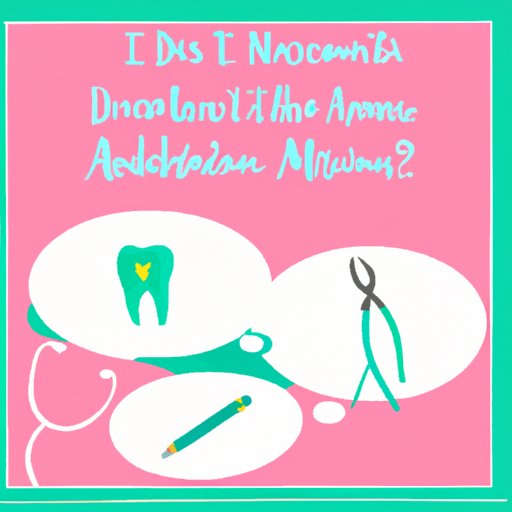I. Introduction
Have you ever considered a career as a dental assistant? Dental assistants play a crucial role in the dental office, supporting the work of the dentist and ensuring the comfort of patients. In this article, we provide a step-by-step guide on becoming a dental assistant, including education and certification requirements, job duties and skills, and tips for landing a job. We’ll also discuss the benefits of being a dental assistant, debunk common misconceptions, and explore opportunities for career growth in this exciting field.
II. Step-by-Step Guide: How to Become a Dental Assistant
A. Basic Requirements
There are basic requirements that you will need to complete in order to become a dental assistant. These include education and training, as well as certification and licensure in some states.
1. Education and Training
Most dental assistants complete a formal education program, such as a diploma, certificate, or associate’s degree from a community college or technical school. These programs typically take between 9 months and 2 years to complete and cover topics such as dental anatomy, medical terminology, and chairside assisting.
In addition to formal education, many dental assistants also receive on-the-job training from their employer. This may include learning specific office procedures, dental software systems, and hands-on training with dental instruments and materials.
2. Certification and Licensing
Certification and licensing requirements for dental assistants vary by state. Some states require dental assistants to be licensed, while others do not. Even in states where it is not required, certification can be a valuable asset for your career and may be required by some employers.
The Dental Assisting National Board (DANB) offers certification for dental assistants, including the Certified Dental Assistant (CDA) and the Certified Orthodontic Assistant (COA) credentials. To be eligible for these certifications, you must have completed an accredited education program or have a certain number of years of experience working as a dental assistant. You will also need to pass an exam.
B. Job Duties and Skills
Dental assistants perform a wide variety of tasks to support the work of the dentist and ensure the comfort of patients. These can include assisting with procedures, providing patient care, and completing administrative tasks.
1. Assisting the Dentist
One of the primary roles of a dental assistant is to assist the dentist during procedures. This may include preparing the treatment room, handing instruments to the dentist, and providing suction to keep the patient’s mouth dry. The dental assistant also helps to educate patients on proper oral hygiene and post-treatment care.
2. Patient Care
Dental assistants also provide basic patient care, such as taking and recording vital signs and providing information on pain management and post-treatment care. They may also help to comfort and reassure anxious patients and provide support during procedures.
3. Administrative Tasks
Finally, dental assistants often complete administrative tasks, such as scheduling appointments, maintaining patient records, and ordering supplies.
C. Tips to Land a Job as a Dental Assistant
Once you have completed your education and training, landing a job as a dental assistant can be competitive. Here are a few tips to help you stand out:
1. Build Professional Relationships
Attend local dental conferences and events, and network with other dental professionals. Building relationships with local dentists and dental offices can help you hear about job openings and get your foot in the door.
2. Attend Job Fairs
Dental job fairs and career events are a great way to connect with potential employers. Be sure to bring copies of your resume and dress professionally.
III. Interview with a Dental Assistant
A. Overview of Interviewee
We spoke with Jane Smith, a dental assistant with over 5 years of experience in the field. Jane completed a certificate program in dental assisting and is DANB-certified as a CDA.
B. Training and Certification
We asked Jane about her experience with training and certification. “My certificate program was really helpful in giving me a solid foundation in dental assisting,” she said. “And getting certified was important for me because it showed potential employers that I had a certain level of knowledge and skill.”
C. Daily Routine
Jane shared that her daily routine as a dental assistant involves a mix of administrative tasks and patient care. “I arrive early to set up treatment rooms and prepare equipment and materials for the day,” she said. “I assist the dentist during procedures and help patients with pre- and post-treatment care. And throughout the day, I’m also responsible for maintaining patient records and scheduling appointments.”
D. Tips for Aspiring Dental Assistants
We asked Jane what advice she would give to someone interested in becoming a dental assistant. “Get as much hands-on experience as you can,” she said. “And don’t be afraid to ask questions and learn from your colleagues. This is a great field with lots of opportunities for growth, so keep learning and don’t give up!”
IV. Benefits of Being a Dental Assistant
Dental assisting can be a rewarding career, both personally and professionally. Here are just a few of the benefits:
A. Flexibility
Many dental offices offer flexible scheduling, including full- and part-time positions and opportunities for job sharing or telecommuting.
B. Work-Life Balance
Because many dental offices operate during regular business hours, dental assistants often have evenings and weekends off, providing a better work-life balance.
C. Competitive Salary
According to the Bureau of Labor Statistics, the median pay for dental assistants in 2020 was $41,180 per year. Job growth in the field is also projected to be strong, with a 7% increase expected from 2019-2029.
D. Opportunity for Making a Difference
Dental assistants play a vital role in ensuring the comfort and well-being of patients. “I love being able to help patients feel more at ease during procedures,” Jane said. “It’s a great feeling to know that you’re making a difference in someone’s life.”

V. Common Misconceptions About Being a Dental Assistant
A. Myths and Misconceptions
There are many misconceptions about what it’s like to be a dental assistant. Some people may think it’s a low-skill job, or that it’s boring and repetitive.
B. Explanation and Debunking of these Misconceptions
“In reality, dental assisting is a highly skilled profession,” Jane explained. “You need to have a strong knowledge of dental anatomy and terminology, as well as excellent hand-eye coordination and attention to detail. And every day is different, with new patients and procedures to assist with.”
VI. Online Education Options for Becoming a Dental Assistant
A. Overview of Online Education Programs
Online education programs can be a convenient option for those interested in becoming a dental assistant. Many community colleges and technical schools offer online courses and programs that cover the same material as traditional in-person classes.
B. Pros and Cons of Online Education
While online education can be a great option for some students, it’s important to weigh the pros and cons before making a decision. Pros include flexible scheduling and the ability to learn at your own pace. Cons may include less interaction with instructors and peers, and the need for strong self-discipline and time management skills.
C. Programs Available and their Fees
Programs and fees will vary depending on the school and program. It’s important to research different options and compare costs and curriculum before making a decision.
VII. Potential Career Growth for Dental Assistants
A. Specialization in Specific Areas of Dentistry
With additional education and certification, dental assistants can specialize in specific areas of dentistry, such as orthodontics or endodontics. This can lead to increased job opportunities and higher salaries.
B. Pursuing Related Careers
Dental assisting can also be a great stepping stone to other careers in the dental field, such as dental hygienist or office manager.
VIII. What to Expect on the First Day
A. Preparing for the First Day
Before starting your first day as a dental assistant, be sure to ask your employer about any required training or paperwork.
B. Dress Code
Dental offices may have specific dress codes, so it’s important to ask about any guidelines before your first day. Typically, dental assistants are required to wear scrubs or other comfortable, professional attire.
C. Tasks to Expect
Your tasks on your first day will likely involve learning office procedures and getting to know your colleagues. You may also observe procedures and start assisting with basic tasks.
D. Team Members to Interact with
As a dental assistant, you will work closely with the dentist, as well as other dental hygienists, assistants, and administrative staff. Building strong relationships with these colleagues can help you succeed in your job and advance your career.
IX. Conclusion
Becoming a dental assistant can be a fulfilling and exciting career choice. By completing education and certification requirements, developing key skills, and building professional relationships, you can position yourself for success in this growing field.
Remember to stay open to new opportunities and areas of specialization, and always keep learning and growing as a professional.
